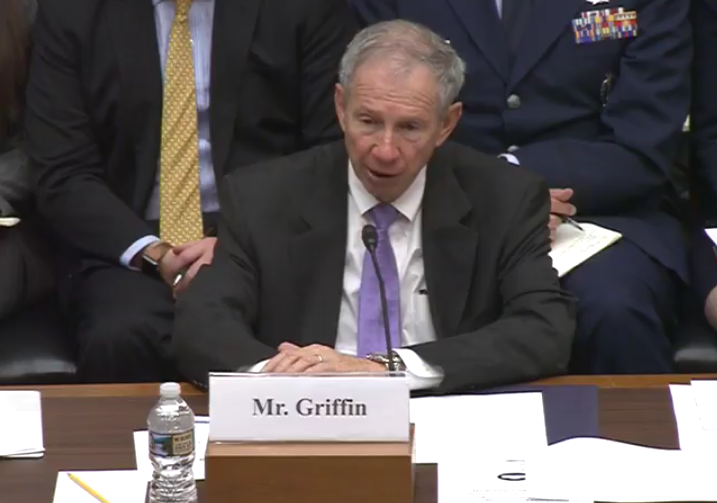
Undersecretary of Defense for Research and Engineering Mike Griffin testifies before the House Armed Services Committee on Thursday. Screenshot photo.
China is the principal bad actor when it comes to both military and industrial espionage, and although there are others, “we have to prioritize” dealing with China because it is such a huge problem, Undersecretary of Defense for Research and Engineering Mike Griffin told Congress Thursday.
At a House Armed Services Committee hearing on military technology transfer, Griffin said the US has been hemorrhaging secrets to China for many years because the US “chose not to” recognize that great power competition didn’t end 27 years ago, and China has a state policy to advance its technology through any means necessary. Kari Bingen, Deputy Undersecretary of Defense for Intelligence, read out loud a Chinese law compelling Chinese state-run and non-state-run industry and academic institutions to actively cooperate with Chinese intelligence.
It’s now up to the US to decide whether it’s going to take Cold War-era measures to rein in China’s vast information-collection enterprise, Griffin said. He noted that it would have been unthinkable during the 1980s to have joint ventures with Russia involving sensitive, dual-use technology, or to allow thousands of Russians to study at American universities, but the US routinely relies on Chinese electronics used in defense systems and hosts more than 30,000 Chinese seeking technology doctorates from US universities.
Moreover, as China has undercut US prices and invested more heavily in electronics, it has a gained a technology edge in this area. More companies seek to “buy the best” and so resort to Chinese vendors. With those products inevitably come electronic “back doors” for spying, Griffin said.
Griffin called China’s commercial joint ventures with US companies “predatory” and said he is working to create incentives for industry not to cooperate with China on sensitive technologies where “their objective is to put [American companies] out of business.”
China, he said, “is playing the long game.”
Most of the problem, Griffin said, is that permission to conduct business with Chinese companies, or allow student visas, or buy Chinese products, or allow Chinese companies to buy US companies or real estate in close proximity to sensitive sites, etc., are decisions “made in isolation” from one other. The US needs to assess the whole of China’s campaign and look at such individual initiatives in the broader context. China, he said, is “an adversary … acting in an adversarial manner” and should no longer be viewed merely as a mischievous trading partner.
Bingen said that in addition to price, performance and schedule, US contractors must now be assessed on “security, as well.” Companies need to see that a robust effort to protect their secrets should be seen not as an expense but as investment in their own future competitiveness, she said.
Members of the Committee asked if the US is taking any offensive action against China—such as deliberately allowing that country to steal false information—to create a deterrent or throw a monkey wrench into its development efforts based on stolen technology. Griffin acknowledged such an effort but would not discuss it in open session.
Griffin and other witnesses were asked several times about the Trans-Pacific Partnership agreement and how it may have had an effect on the Chinese industrial espionage situation, but they all demurred, saying such things were beyond their purview. Several members complained that while the witnesses touted an “all-of-government” approach to dealing with China, there was no evidence of that in discussions of the TPP. “Whole of government is a phrase thrown around like candy at a parade,” Rep. Rick Larsen (D-Wash.) complained to the witnesses. “It’s frustrating … you’re not living up to it,” he said.
Asked why the US seems to have lost its lead in hypersonics, Griffin responded that the US “let it lie for a while” after doing early pioneering work. “That was our choice as a nation,” he said, and one that “we are working to correct” with all possible speed. China, meanwhile, took full advantage of US research, combined it with stolen information, and pumped it up with a massive infusion of funds to achieve lead, Griffin explained. He acknowledged a similar situation with directed energy.